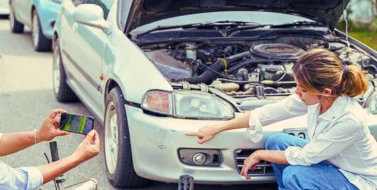Can you sue a drunk driver after an accident? If the fact that the driver was impaired caused the accident, then you can sue the drunk driver. Drunk driving accidents can have life-changing consequences, often resulting in serious injuries or even fatalities. Such events can abruptly halt your life as you know it. However, if you were not the one driving under the influence, you shouldn’t have to pay for the mistake. Luckily, the law allows you to claim compensation if a drunk driver hits you.

Table of Contents
Drunk Driving Statistics in Illinois
In 2022, 292 people died in alcohol-related crashes, accounting for 23% of the 1,268 crash fatalities in Illinois. 21,203 DUI arrests were recorded by the Secretary of State’s office. 91% of eligible drivers lost their driving privileges. 229 drivers under 21 lost their driving privileges. Women accounted for 26% of DUI arrests. Men aged 25-34 had the highest DUI arrest rate, at about 6 per 1,000 licensed drivers. 86% of drivers arrested for DUI were first-time offenders.
The Legal Implications of Driving Under the Influence
Alcohol can affect your driving abilities, even if you’re not legally drunk. Consuming even a small amount of alcohol increases the chances of causing an accident while driving. Driving under the influence may lead to legal consequences, both civil and criminal.
If an individual is driving under the influence may face a civil drunk driving lawsuit and be held responsible for any damages suffered by other drivers involved. If the accident results in drunk driving fatalities, the driver may face a wrongful death lawsuit and have to compensate the family members for wrongful death damages.
If caught by law enforcement, a person driving under the influence may be arrested and charged with a DUI, which may result in a conviction.
Consequences of a DUI Conviction
Illinois law prohibits driving a vehicle while under the influence of alcohol or with a blood alcohol concentration (BAC) of 0.08% or higher.
When a driver is arrested, the state will impose administrative penalties. If convicted, the court will impose further criminal penalties. Offenders may have to pay fines and face jail time. Depending on how many previous DUI convictions an offender has, he or she may face a class A misdemeanor, or a class 1, 2, or class x felony, imprisonment of up to 30 years, fines of up to $25,000, revocation of drivers’ license, and suspension of vehicle registration.
Liability in a Drunk Driving Case
In drunk driving car accidents in Illinois, it is likely that the intoxication caused the accident. However, to prove liability, you must prove the four elements of negligence.
- Duty of care: All drivers have a responsibility to comply with traffic regulations, be cautious of hazards, and prioritize the safety of all road users.
- Breach of duty: If drivers engage in dangerous driving practices such as speeding, reckless driving, or driving under the influence, they are breaching the duty of care.
- Cause: If there is no clear link between the breach and the injuries, there is no cause for legal action.
- Damages: The plaintiff must prove that he or she suffered damages, including damage to their vehicle or bodily harm. They must also provide evidence to substantiate the extent of the damages incurred.
When driving drunk, the other driver has breached the duty of care. But to prove negligence, you must show that the drunk driving caused your damages. For example, If you collided with the other driver because you ran a red light, drunk driving wasn’t the cause of the accident and you won’t have a claim. A drunk driving accident lawyer will assist in proving the elements to establish the negligence of the drunk driver.
Proving Intoxication and Impairment
After a drunk driving accident, you will need evidence to prove fault. The first thing to do after an accident is to report it to the police so that they can file an accident report. If the responding officer suspects that one of the drivers was intoxicated, he or she can ask the driver to submit to a Breathalyzer, urine or blood test. If the test is positive, it provides evidence of intoxication. The accident report will contain this information.
You should get a copy of the accident report as evidence that the driver was under the influence of alcohol.
Gather Evidence to Support Your Case
When filing a claim against a drunk driver, you should gather all the evidence as quickly as possible.
You should gather evidence to support your claim that the other driver was drunk. For example, there may be alcohol bottles or containers in the other driver’s vehicle. You can take pictures of these as evidence that the driver was drinking before the crash. If you can smell alcohol on the driver’s breath, his or her speech was slurred, or he or she was having difficulty walking in a straight line, you can take notes of these before memories and details begin to fade. The police report should contain details such as results of a breathalyzer test providing evidence of intoxication.
Expert Testimony and Witness Statements
If you were involved in a car accident and suspect the other driver was drunk, eyewitness testimony can be crucial in supporting your claim. Try to locate any witnesses who were present at the scene of the crash and ask them for their names and contact information. If a witness can testify that the other driver had slurred speech, lacked coordination, or had trouble standing upright, this can serve as valuable evidence in your case.
Expert witnesses are professionals who possess knowledge in a particular field and are called upon to provide their opinion in court. In cases involving driving under the influence (DUI), these witnesses have knowledge in areas such as forensic toxicology, accident reconstruction, human factors, and more. They provide an impartial evaluation of evidence and offer testimony to help the court understand complex scientific concepts.
Challenges in Suing a Drunk Driver in Illinois
There may be challenges that you face in claiming compensation from a drunk driver. When considering when to hire a car accident injury lawyer, the sooner, the better, as he or she can help you overcome any possible challenges.
Insurance Coverage Limitations
You may face difficulty in recovering damages due to insurance policy limits. In Illinois, many drivers only purchase the minimum amount of auto insurance, which covers $20,000 for property damage and $25,000 for one person’s personal injuries or death.
If your damages surpass the policy limit, and you need to recover more, you may have the option to take legal action against the driver responsible for the accident. If the insurance company agrees to a settlement after getting hit by a drunk driver to the policy limit, you can accept the amount and then sue the driver personally for the remaining recovery. However, if the driver has little or no assets, you may not be able to recover the damages.
Comparative Negligence Laws
It’s possible that you may have been partially responsible for the accident, even if the other driver was primarily at fault. This is known as comparative negligence.
The other party may prove your negligence also played a role in causing the accident. This can lead to a reduction or elimination of your claim, based on the degree of your negligence. The percentage of your negligence is determined by considering how much it contributed to the accident.
For example, if a judge or jury finds that you were 20% responsible for the accident, and the other driver was 80% responsible, you will only be entitled to 80% of the damages you claimed. So, if your claim was for $100,000, you will only receive $80,000.
In Illinois, if you were more than 50% responsible for the accident, you will not be able to receive any damages.
Counterclaims by the Defendant
A counterclaim is a legal claim that the defendant can file against the plaintiff in a lawsuit. The defendant is the person who is sued, while the plaintiff is the person who filed the original lawsuit. A counterclaim is not a separate lawsuit, and its allegations must usually relate to the subject of the original complaint. In other words, the counterclaim must pertain to the underlying car accident, and not to some other legal dispute. Essentially, a counterclaim is the defendant’s way of claiming he or she is not at fault, but rather the victim.
For instance, the defendant may claim that you were negligent at the time of the accident by texting on your phone while driving, speeding, driving while intoxicated or tired, driving a defective car, jaywalking, or making sudden movements if you are a pedestrian. If the defendant can prove these allegations, and they were the cause of the accident rather than intoxication, you may end up facing liability for the accident.





